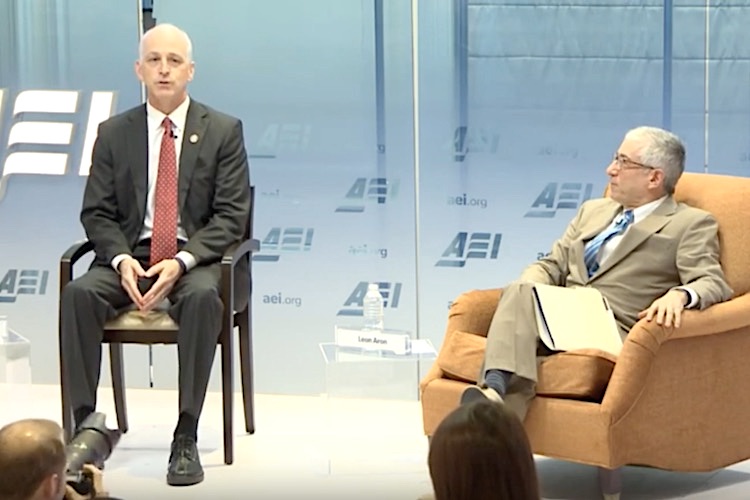On June 15, American Enterprise Institute hosted a discussion on the threat Vladimir Putin’s regime poses to Western countries and institutions. How should Washington deal with Putin’s support of populist movements in the EU, and counter the Kremlin’s cyberattacks, interventions in elections, and constant threat of military intervention? These and other questions were addressed by the AEI’s Director of Russian Studies Leon Aron and U.S. representative Adam Smith (D-WA).

Adam Smith (left) and Leon Aron at the AEI headquarters in Washington, D.C. Photo: Youtube.
Adam Smith:
- Russia is bent on undermining Western democracy and institutions such as NATO and the EU.
- Seen through this lens, Russia’s actions in Crimea and the Donbas are more the result of anti-Westernism than they are specifically about Ukraine itself.
- Putin fears chaos, and believes that people cannot govern themselves. He wants to make the case that liberal democracy doesn’t work as a form of government.
- The West must strengthen its alliances if it is to deter further Russian aggression. Russia poses a significant threat to the West, its way of life, and its ability to prosper.
- That being said, the key to global peace and prosperity is not unipolarity, but rather multipolarity—a world in which a number of countries (Russia, China, Brazil, the U.S., etc.) manage and influence global affairs.
- The West did not do enough to include Russia in Western institutions after the end of the Cold War. Russia resented this, and consequently, the Kremlin began to see NATO enlargement as a security threat.
- Putin must leave power if any significant improvements are to be made in U.S.-Russian relations.
- Russia needs to succeed as a country if its people are to see the benefits of participating in the liberal world order.
- That is why sanctions that negatively affect the Russian people (i.e. the Russian economy) could easily backfire.
Leon Aron: What should the United States’ plan be in Syria, especially vis-à-vis Russia?
Smith:
- The United States’ most viable option is to accept a stalemate and partition the country.
- Ultimately, Russia’s main goal in Syria is to keep Assad in power.
- The United States should stop wasting time negotiating a solution with Moscow.
Smith:
- Nowadays, reality can be very easily shaped and distorted because of how quickly messaging can spread online through social media.
- The United States needs to start countering Russia’s information warfare with its own targeted messaging—particularly to the Russian people.
- The main message should be that Putin has been failing the Russian people. It is important that the U.S. develop a “cyber” version of Voice of America.
- The United States should not allow its opponents to dominate the global communications space.
Q&A:
- Can you describe in greater detail what your recent “Russia strategy” bill looks like, and what its chances of succeeding are?
Smith:
- Ultimately, the bill calls on the Trump administration to put together a strategy to:
- increase the U.S. presence in Eastern Europe;
- dedicate resources to cyberspace and cyber strategy;
- better understand Russia’s information warfare and messaging tactics;
- strengthen Western institutions (such as NATO and the EU).
- There is generally a great deal of bipartisan support for action on Russia, although the House seems somewhat more reluctant than the Senate.
- A major problem is that the more desperate Russia becomes (i.e. in terms of the economy), the more it is driven by harmful internal forces, such as nationalism.
- Consequently, American policy should focus more on creating economic opportunity for the Russian people, rather than backing the country into a corner – such a strategy could easily backfire, playing into Putin’s “victimhood/return-to-greatness” narrative.
- Sanctions should target Putin’s inner circle, rather than the Russian economy as a whole.
- What are your comments on the recent Bloomberg report that as many as 39 U.S. states were affected by Russian hacking efforts?
Smith:
- The United States must reevaluate the security of its voting system.
- Just because the U.S. can’t definitively prove that Russia altered the course of the election, that doesn’t mean that Moscow’s attempts were insignificant.
- People vote based on both explicit and subliminal information—so any meddling, no matter how serious, should be of concern.
- Considering the recent election in Iran, with the hardliners having suffered a defeat, is there any chance that the United States could draw Iran away from Russia’s sphere of influence, and back to its own?
Smith:
- It is challenging to predict how this might play out under the Trump administration—the President is very hawkish on Iran, but very soft on Russia. Considering that the two countries are major allies, it is unclear how this cognitive dissonance will affect U.S. foreign policy over the next few years.
- In any event, the United States should not be choosing sides over the Sunni/Shiite divide. Instead, it should try to act as a mediator of sorts, working to broker an understanding between the two sides.
You can watch full video of the event below:

